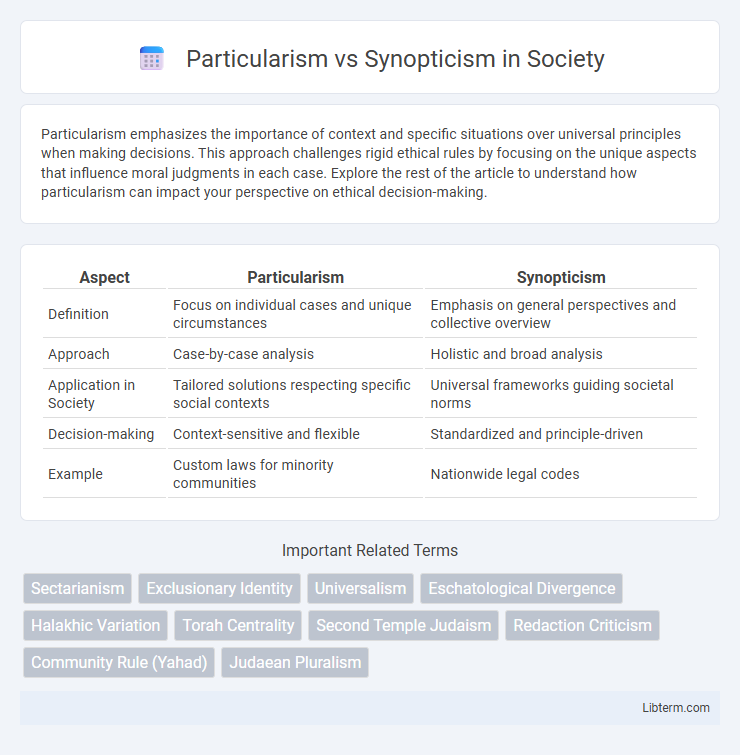Particularism emphasizes the importance of context and specific situations over universal principles when making decisions. This approach challenges rigid ethical rules by focusing on the unique aspects that influence moral judgments in each case. Explore the rest of the article to understand how particularism can impact your perspective on ethical decision-making.
Table of Comparison
| Aspect | Particularism | Synopticism |
|---|---|---|
| Definition | Focus on individual cases and unique circumstances | Emphasis on general perspectives and collective overview |
| Approach | Case-by-case analysis | Holistic and broad analysis |
| Application in Society | Tailored solutions respecting specific social contexts | Universal frameworks guiding societal norms |
| Decision-making | Context-sensitive and flexible | Standardized and principle-driven |
| Example | Custom laws for minority communities | Nationwide legal codes |
Understanding Particularism and Synopticism
Understanding Particularism involves recognizing its emphasis on the uniqueness and specificity of individual cases, stressing context and detailed analysis over broad generalizations. Synopticism, in contrast, seeks to identify common patterns and overarching frameworks by synthesizing diverse data points into cohesive, general viewpoints. Both approaches shape research methodologies by balancing detailed scrutiny with holistic understanding in fields such as sociology, anthropology, and theology.
Historical Origins of Particularism
Particularism, rooted in early 20th-century philosophical debates, emphasizes the importance of individual cases over general principles, tracing its origins to the works of Max Weber and early pragmatists like William James. This approach arose as a reaction against sweeping generalizations in moral and social theories, asserting that context-specific judgments better capture the complexity of human behavior. The historical development of Particularism highlights its alignment with empirical observations and resistance to the rigidity of universalist frameworks.
The Emergence of Synopticism
The emergence of synopticism marked a significant shift in biblical scholarship, emphasizing the comparative study of the Synoptic Gospels--Matthew, Mark, and Luke--to identify their literary relationships and shared sources. Scholars developed the synoptic problem framework to analyze similarities and differences, highlighting common narratives and linguistic patterns that suggest interdependence among these texts. This approach contrasted with particularism, which treated each Gospel as an independent work, by fostering a systematic investigation into the historical and theological connections within the Synoptic tradition.
Core Principles of Particularism
Particularism emphasizes that moral judgments depend on the specific context of each situation rather than applying universal rules, highlighting the variability and complexity of ethical decision-making. This approach rejects fixed moral principles, asserting that what is right or wrong can change based on the unique features and circumstances surrounding an action. Particularism values sensitivity to context, advocating for flexible and nuanced evaluations rather than rigid adherence to predefined moral laws.
Key Features of Synopticism
Synopticism is characterized by the comprehensive integration of diverse perspectives into a unified framework, emphasizing broad coherence and thematic consistency. It prioritizes holistic analysis, enabling the identification of overarching patterns and relationships across various data sets or viewpoints. This approach facilitates synthesis and generalization, making complex information more accessible and actionable for decision-making and research.
Particularism vs Synopticism: Theoretical Differences
Particularism emphasizes detailed, context-specific analysis of individual cases, rejecting broad generalizations and universal theories, while Synopticism advocates synthesizing information to create overarching frameworks and generalized explanations. Particularism prioritizes experiential knowledge and the uniqueness of each event, contrasting with Synopticism's focus on identifying common patterns and systemic relationships. The theoretical divergence centers on epistemological approaches: Particularism values singularity and ambiguity, whereas Synopticism seeks coherence and predictability across diverse phenomena.
Practical Applications in Social Sciences
Particularism emphasizes the detailed study of specific cultural or social contexts, allowing researchers to capture unique, localized phenomena and avoid overgeneralization in social sciences. Synopticism seeks to identify broad patterns and universal principles across societies, enabling comparative analysis and theory-building on a larger scale. Practical applications of particularism include ethnographic case studies and culturally sensitive policy-making, while synopticism underpins cross-cultural surveys, meta-analyses, and the development of generalized social theories.
Advantages and Limitations of Particularism
Particularism in philosophy emphasizes the importance of context and specific details when making moral or epistemic judgments, allowing for nuanced and flexible decision-making tailored to individual cases. This approach excels at capturing the complexity of real-world situations and avoiding rigid rule-based errors but faces limitations such as potential inconsistency and difficulty in establishing universal standards. Critics argue that particularism can lead to subjective interpretations and challenges in applying coherent principles across diverse scenarios.
Strengths and Weaknesses of Synopticism
Synopticism's strength lies in its holistic approach, synthesizing multiple perspectives to reveal overarching themes and patterns across texts. It can uncover connections that remain hidden when studying individual documents in isolation, facilitating comprehensive understanding. However, its weakness includes potential oversimplification of unique details, risking loss of nuanced meanings specific to each account.
Bridging the Gap: Towards Integrative Approaches
Particularism emphasizes the distinctiveness of individual cases or phenomena, while Synopticism seeks overarching patterns and generalizations across data sets. Bridging the gap between these perspectives involves developing integrative approaches that balance detailed contextual analysis with broad theoretical frameworks, fostering comprehensive understanding. Methods such as mixed-methods research, which combine qualitative depth with quantitative breadth, exemplify this integrative trend in contemporary scholarship.
Particularism Infographic

 libterm.com
libterm.com